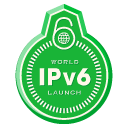What is IPv6?
IPv6 is short for “Internet Protocol Version 6,” the next generation of the language that computers use to communicate with each other on the Internet. IPv6 is set to replace the IPv4 standard in use since 1981.
Virginia Tech began experimenting with IPv6 networking in 1997 and currently supports IPv6 on the vast majority of campus networks. We have been using Google over IPv6 since it was first offered in 2009. If you have been using Google services from on campus, you've likely been using IPv6 without even realizing it!
The most important feature of IPv6 is a much larger address space than in IPv4. The length of an IPv6 address is 128 bits (approximately 340 trillion trillion trillion addresses), compared to 32 bits in IPv4 (4 billion unique addresses). The use of globally-unique addresses is critical to creating an open and free network of people and devices that can all interact as peers. On February 3, 2011 the last remaining addresses in the IPv4 “free pool” were assigned -- meaning the move to IPv6 is more important now than ever.
IPv6 at Virginia Tech
Virginia Tech is currently a leader in large-scale production deployment of IPv6, with nearly thirteen years of experience and thousands of native IPv6 clients. In 2010, the university was ranked by Google as one of the largest deployments worldwide, behind only nations like France and China. Globally reachable by IPv6, Virginia Tech faculty are able to conduct research around the world using IPv6-only networks.
More recently, the university was asked to consult and advise the United States Federal IPv6 Task Force to offer expertise on what we've learned about the transition to IPv6. Randy Marchany, Virginia Tech's Chief Information Security Officer, and Carl Harris, Chief Technology Architect, have presented for federal agency CIOs at the White House Briefing Center in January 2011, at the 2011 Department of Enegery Information Management Conference in March 2011, and presented at the IPv6 World Congress in London, England in June, 2011.
Virginia Tech has joined World IPv6 Launch. Major Internet service providers (ISPs), home networking equipment manufacturers, and web companies around the world are coming together to permanently enable IPv6 for their products and services by 6 June 2012.
The Transition from IPv4 to IPv6
To support the growing demand of an increasing number of IP (or Internet) capable devices on the campus network during the transition, Virginia Tech has adopted two strategies:
-
Strategy 1: Use “Private” IPv4 networks with Network Address Translation (NAT)
In early April, Communications Network Services (CNS) implemented a pilot “private network with NAT” configuration for the residential Ethernet (wired) connections of the Graduate Life Center (GLC). “Private” IPv4 addressing provides an immediate benefit by reducing the number of global IP addresses consumed by residence hall networks. The user experience with IPv4 private addresses and NAT is similar to the typical residential service offered by commercial ISPs and, in many cases, will be less restrictive.
Private addresses and NAT have been used on the campus wireless network for several years. To extend the university's ability to support IPv4 network access, CNS plans to gradually convert residence hall Ethernet (wired) connections to private IP addressing. Over time we will also move selected campus networks and services to private address space, where beneficial.
-
Strategy 2: Continue to provide and support IPv6 capable networks across campus
IPv6 is already available on most Virginia Tech networks and provides users with a unique Internet address without using Network Address Translation. Outside the campus network, IPv6 adoption has been very gradual, so it will take some time for the majority of global Internet services to become IPv6 capable.
Virginia Tech will continue to offer both IPv4 with private addressing and IPv6, on a "dual-stack" network, for the foreseeable future.
Useful Links

- Virginia Tech has joined World IPv6 Launch.
- Check your IPv6 readiness with a more complete series of tests
- IPv6 adoption statistics from Google
- IPv6 article at Wikipedia


